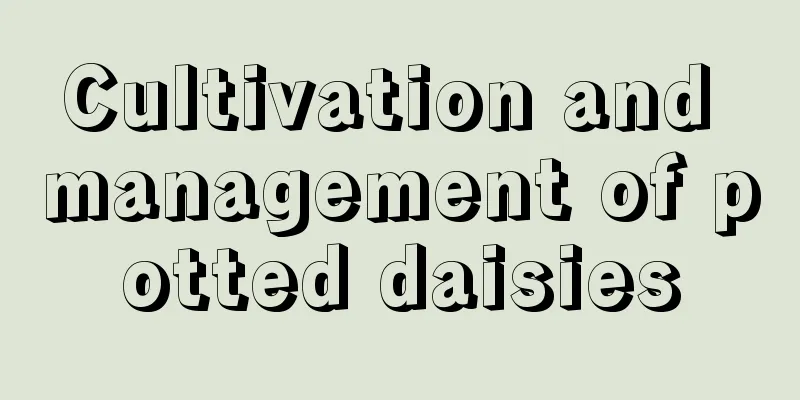Cultivation and management of potted daisies

Soil management for potted plantsThe matrix is loose. The cultivation substrate should have good drainage and air permeability, with a clay content of 15%-30%. About 15% of organic fertilizer (such as compost) can be added, and 1 kg of complete balanced fertilizer and 2 kg of slow-release fertilizer should be applied per cubic meter of substrate. Potted plant management and transplantingAfter hardening the seedlings, they can be transplanted into pots using 12 cm diameter nutrient pots or flower pots. After potting, water the plant thoroughly to help it take root. Transplanting in early October is better than transplanting in late October because if transplanted in early October, the roots of the plant can grow firmly in the container before frost arrives. Potted plant management and wateringWater should be poured thoroughly once after potting. The substrate can be allowed to dry slightly between waterings, and then watered sufficiently. Following the principle of alternating dry and wet times is beneficial to the growth and development of the root system. Care should be taken to keep the substrate moist but not saturated. Water should be controlled when budding to prevent the flower stems from becoming too long. Temperature for potted plantsThe growth room temperature is 10℃ to 12℃. Covering is required when growing outdoors. To obtain good plant quality, grow daisies in cool conditions as much as possible, but avoid frost to prevent the plants from freezing. Daisies can safely overwinter at temperatures above 5°C. When the temperature is below 6℃, the growth is relatively slow and the formation of flower buds is delayed; when the temperature is above 12℃, the leaves of the plant become larger, the flower stems become thin and weak, the number of flowers decreases, and the growth potential weakens. As the outdoor temperature gradually warms up, you should pay attention to timely ventilation. |
<<: How to plant rose seedlings
>>: How to propagate honeysuckle
Recommend
Before you repot your flowers, you need to know these first!
The two sides of repotting If you want to give pl...
Yew efficacy, yew price
1. What are the effects 1. Inhibit cancer: The gr...
Can I grow a grapefruit tree at home?
Can I grow a grapefruit tree at home? You can pla...
Basil pests and diseases and their control
Basil diseases and their prevention and treatment...
After the succulents bloom, cut them quickly, otherwise they will all die immediately!
Succulent Flowering Many flower lovers are surpri...
Can red birch bloom in winter?
Can it bloom in winter? So, in the cold winter, i...
What is basal fertilizer?
Introduction to base fertilizer Basal fertilizer ...
What kind of soil do orchids need?
1. Soil conditions The substrate for growing orch...
The role of ceramsite, how to use ceramsite to grow flowers
1. Function 1. Breathable and water-permeable: Th...
The efficacy and function of Artemisia sibiricum
1. Therapeutic effects and functions 1. Artemisia...
Can succulents be grown with nutrient soil and river sand?
Can succulents be grown with nutrient soil and ri...
Cultivation methods and precautions of bulbous begonia
The bulbous begonia is an easy-to-grow variety of...
What should I pay attention to when growing lotus? Can it be placed on the indoor balcony?
1. Breeding precautions 1. Ensure sunlight: Sunli...
What plants are good to put at the entrance?
1. Monstera The leaves of Monstera are very pecul...
Can Schefflera be exposed to the sun? Does it need to be exposed to the sun often?
Can Schefflera chinensis be exposed to the sun? S...









